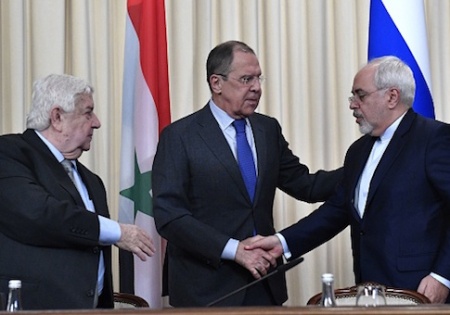Iran, Russia Boost Military Ties Amid U.S. Action In Syria, Washington Free Beacon,
(Please see also, Obama’s hidden Iran deal giveaway. — DM)

Russian Foreign Minister Sergei Lavrov (C) shakes hands with his Iranian counterpart Mohammad Javad Zarif (R) as Syrian Foreign Minister Walid Muallem (L) looks on after a joint press conference after their talks in Moscow on April 14, 2017./ AFP PHOTO ALEXANDER NEMENOV/AFP/Getty Images)
Russia can serve as a major military ally for Iran and help provide it with not just military capabilities, but nuclear technology. Iran and Russia inked several deals in the past years to build a series of new light water nuclear reactors across the Islamic Republic.
***********************
Iran and Russia are moving closer together in their military alliance, working to boost ties and coordination in Syria and elsewhere in the region following the U.S. decision to launch a military strike in Syria, according to regional reports and experts.
Iran’s defense minister is slated to visit Moscow at the end of the month to discuss increased military ties, a move that is meant to deter U.S. action in the region and show a sign of increased force, according to regional experts who spoke to the Washington Free Beacon.
The Tehran-Moscow axis has been growing since the landmark Iran nuclear deal, with Russia making good on a series of weapons deliveries, including the Russian-made S-300 missile defense system. The two countries have been signing an additional number of military deals in recent months and that cooperation is likely to increase in light of the Trump administration’s decision to launch strikes against embattled Syrian President Bashar al-Assad, who is being backed by both Russia and Iran.
Iranian leaders have signaled in recent days that the alliance with Russia is a top priority going forward and that a number of new military deals are in the works.
“The visit by Iranian [President Hassan] Rouhani that took place on March 28 was another step toward developing extensive cooperation between Moscow and Tehran,” Iranian Ambassador to Russia Mehdi Sanaei was quoted in the country’s state-controlled press.
“We hope that we will witness even broader bilateral ties across all areas in the future,” Sanaei said during an event last week marking the Iranian Army Day.
Sanaei also celebrated the recent delivery by Russia of the S-300 missile system, which Tehran had been coveting for some time. The system is viewed by Iran as a major deterrence factor aimed at intimidating U.S. forces in the region.
The delivery of the S-300 system to Iran is a sign that Russia has an interest in bolstering Tehran’s military might, Sanaei said.
Since signing a massive military deal in 2015 with Russia, “important steps have been taken to strengthen bilateral relations in the area of defense,” Sanaei said. “One such step was the delivery of S-300 missile systems to Iran. This is an indicator of mutual trust in defense cooperation.”
As Iran’s defense minister gears up to visit Moscow, regional experts predict that the military ties between the countries will only increase as Assad comes under greater international pressure.
However, the alliance between the countries remains fragile and largely one of convenience.
“Russia and Iran have a similar goal in keeping Assad in power at all costs,” Boris Zilberman, a Russia expert at the Foundation for Defense of Democracies’ (FDD) Center on Sanctions and Illicit Finance, told the Free Beacon. “However, how each perceives the end state in Syria and the other’s role in that future is one of the big questions in the relationship.”
In the short term, both Iran and Russia will aggressively work to “show a united front after America’s first strike on the Assad regime,” Zilberman said. “This is what we are seeing in the flurry of activity, but it is yet to be seen if anything of substance comes out of these talks.”
Behnam Ben Taleblu, a senior Iran analyst at FDD, said that Russia views Iran as a chief counter to U.S. power in the region. The alliance between the countries is likely to strengthen as long as Moscow can use Tehran to offset American influence in the region.
“Russia can and will likely continue to use Iran instrumentally in its larger strategic competition with the United States,” Ben Taleblu said. “One wonders however, how the leadership of the Islamic Republic, which derided the late Shah of Iran for his closeness to the U.S. are able to justify—legally, politically, and even spiritually, the concessions they have made to befriend Russia. As a reminder, no country has taken more territory away from Iran and threatened its sovereignty in the past half millennia than Russia.”
Russia can serve as a major military ally for Iran and help provide it with not just military capabilities, but nuclear technology. Iran and Russia inked several deals in the past years to build a series of new light water nuclear reactors across the Islamic Republic.
“For the past two years Tehran has been drawing closer to Moscow,” Ben Taleblu explained. “Iran will look to Russia to help it drive the U.S. from the region, as well as support its nuclear development under the auspices of the [Iran deal], and engage in a highly selective modernization process for its military. Russia and China will likely become the two largest sources for arms as a UN-mandated arms ban is set to expire in 2020.”







Recent Comments